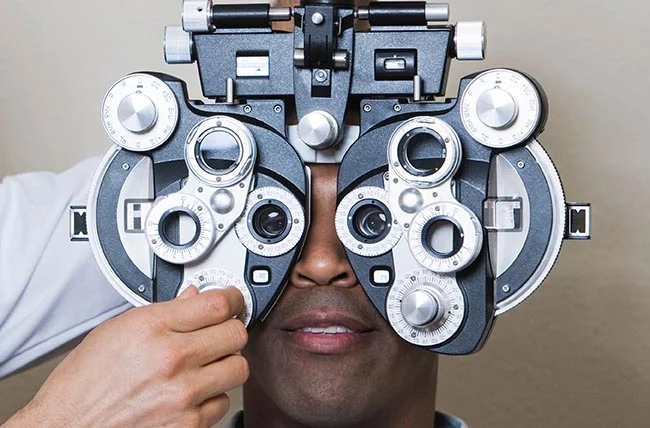Introduction
In our fast-paced world, where digital screens dominate our daily lives, maintaining optimal eye health is more crucial than ever. Regular eye exams play an indispensable role in ensuring that our vision remains sharp and that any underlying issues are detected early. This comprehensive guide delves into the myriad reasons why scheduling routine eye check-ups is a critical aspect of maintaining overall health and well-being.
Detecting Eye Diseases Early
One of the paramount reasons for regular eye exams is the early detection of eye diseases. Conditions such as glaucoma, macular degeneration, and cataracts often develop without noticeable symptoms in their initial stages. By the time symptoms become apparent, significant and sometimes irreversible damage may have occurred.
Glaucoma: The Silent Thief of Sight
Glaucoma, often referred to as the “silent thief of sight,” can lead to permanent vision loss if not detected early. During an eye exam, optometrists measure intraocular pressure and examine the optic nerve for signs of glaucoma. Early intervention can prevent further damage and preserve vision.
Macular Degeneration: Protecting Central Vision
Age-related macular degeneration (AMD) is a leading cause of vision loss in older adults. Regular eye exams can identify the early signs of AMD, allowing for timely management and treatment. Early detection is crucial to slow the progression of the disease and maintain central vision.
Cataracts: Clarity Restored
Cataracts cause the lens of the eye to become cloudy, leading to blurry vision. Regular eye exams can monitor the development of cataracts and determine the appropriate time for surgical intervention, restoring clear vision and improving quality of life.
Correcting Vision Problems
Many individuals experience vision problems that can significantly impact daily activities and overall quality of life. **Refractive errors** such as **myopia (nearsightedness)**, **hyperopia (farsightedness)**, and **astigmatism** are common conditions that can be effectively corrected with the right prescription lenses.
Updating Prescriptions
Vision can change over time, and what may have been the perfect prescription a year ago may no longer be effective. Regular eye exams ensure that your prescription is up-to-date, providing the clearest vision possible and preventing eye strain and headaches.
Contact Lens Fittings
For those who prefer contact lenses over glasses, routine eye exams are essential to ensure proper fitting and eye health. An optometrist will assess the corneal curvature and recommend the most suitable type of contact lenses, minimizing the risk of complications such as infections or corneal abrasions.
Children’s Vision Health
Regular eye exams are not just for adults. **Children’s vision health** is critical for their development and academic performance. Undetected vision problems can affect a child’s ability to learn and participate in activities.
Early Detection of Vision Issues
Children may not always realize or communicate that they are having vision problems. Regular eye exams can detect issues such as strabismus (crossed eyes), amblyopia (lazy eye), and refractive errors early on. Early intervention can correct these problems and prevent long-term visual impairment.
Supporting Learning and Development
Clear vision is essential for reading, writing, and overall learning. Children with uncorrected vision problems may struggle academically and socially. Regular eye exams ensure that children have the visual clarity they need to succeed in school and other activities.
Overall Health Monitoring
Eye exams are not just about vision; they can also provide insights into your overall health. The eyes are windows to many systemic conditions, and a comprehensive eye exam can reveal signs of serious health issues.
Detecting Systemic Diseases
Conditions such as diabetes, high blood pressure, and high cholesterol can be detected through changes in the blood vessels and structures within the eyes. Early detection through eye exams can lead to prompt medical intervention, potentially saving lives.
Assessing Neurological Health
Eye exams can also reveal signs of neurological conditions such as multiple sclerosis and brain tumors. Optometrists can detect abnormalities in the optic nerve and other eye structures that may indicate underlying neurological issues.
Preventing Digital Eye Strain
In today’s digital age, many people spend significant amounts of time staring at screens, leading to digital eye strain. Symptoms include dry eyes, headaches, and blurred vision. Regular eye exams can help manage and alleviate these symptoms.
Customized Recommendations
An optometrist can provide personalized recommendations to reduce digital eye strain, such as proper screen positioning, appropriate lighting, and the use of computer glasses. These measures can enhance comfort and prevent long-term damage to the eyes.
Maintaining Quality of Life
Vision is one of our most vital senses, and maintaining good eye health is essential for overall quality of life. Regular eye exams ensure that you can enjoy life to the fullest, whether it’s driving, reading, or engaging in hobbies.
Aging and Vision
As we age, our vision naturally changes. Regular eye exams can help manage these changes and address age-related vision issues, ensuring that we maintain independence and continue to engage in our favorite activities.
Peace of Mind
Knowing that your eyes are healthy provides peace of mind. Regular eye exams can reassure you that your vision is in good condition and that any potential issues are being monitored and managed.
Conclusion
In conclusion, regular eye exams are a vital component of maintaining overall health and well-being. They play a crucial role in detecting eye diseases early, correcting vision problems, monitoring children’s vision health, and providing insights into systemic health issues. By scheduling routine eye exams, you can ensure that your eyes remain healthy and your vision stays clear, enhancing your quality of life and peace of mind. Prioritize your eye health today by booking your next eye exam with a qualified optometrist.


